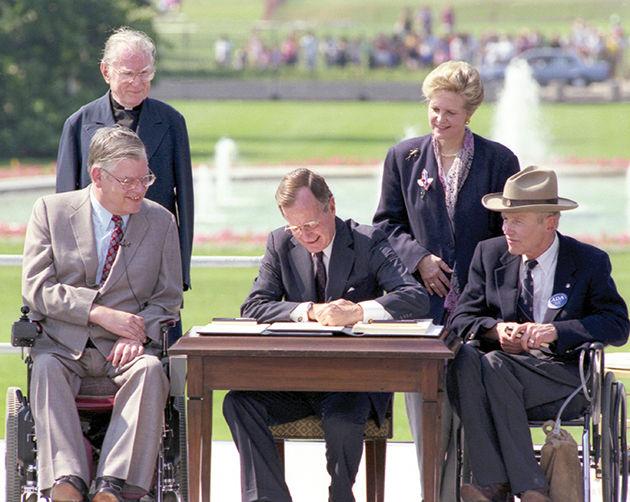One of the legacies of George H.W. Bush — the Americans with Disabilities Act — will come under a panel’s spotlight on its 25th anniversary Thursday.
Lex Frieden, professor of health informatics and physical medicine and rehabilitation at the University of Texas Health Science Center at Houston, along with panelists Clayland Boyden Gray, founding partner of the D.C.-based law firm Boyden Gray & Associates LLP., and Larisa DeSantis, assistant professor of earth and environmental sciences at Vanderbilt University, will share testimony on their involvement with the act.
Frieden was a part of the grassroots effort to write and pass the ADA. He will discuss the life challenges he faced after being disabled from a car accident. Frieden faced some difficulty in his collegiate career because of his disability, said Warren Finch, director of the George Bush Presidential Library and Museum.
“Lex applied to college, but was rejected because of his disability,” Finch said. “Since the act was passed, things have surely changed.”
Gray, a former United States ambassador to the European Union, was part of the White House Council Representative to Bush who helped ensure the ADA’s passing.
DeSantis was the poster child for the Epilepsy Society in 1989 and visited Bush in the Oval Office prior to the passing of the ADA.
Finch said there were many challenges before the act was passed, and some of those challenges remain today.
“The landscape of America was completely changed after the ADA passed,” Finch said. “Things like movie theaters and sidewalks could now be navigated by people in wheelchairs. It didn’t always used to be like that.”
Kristie Orr, director of the Disability Services at Texas A&M University, said the ADA was influential in breaking barriers unique to disabled people.
“It is aimed at reducing all kinds of barriers — physical, learning, attitudinal and others,” Orr said. “The ADA has brought the issues of equal access for individuals with disabilities to the forefront and paved the way for students with disabilities to gain access to their education.”
Orr said the new focus in the coming years is online capabilities to help disabled people have better access.
“[It] is a problem on campuses when instructors use these technologies in class without realizing that some students with disabilities may not have access to the material,” Finch said. “Technology can be an equalizer as students use things like text-to-speech or electronic textbooks, but can also be a barrier when there are videos that are not captioned for students who are deaf or website information is not accessible for students with visual impairments.”
The event will take place at 7 p.m. Thursday in the Annenberg Presidential Conference Center.
Bush School to celebrate 25th anniversary of ADA with panel
November 3, 2015
Photo by Provided
Thursday the Bush School will celebrate the 25th anniversary since President George H.W. Bush signed the Americans with Disabilities Act.
0
Donate to The Battalion
Your donation will support the student journalists of Texas A&M University - College Station. Your contribution will allow us to purchase equipment and cover our annual website hosting costs.
More to Discover









